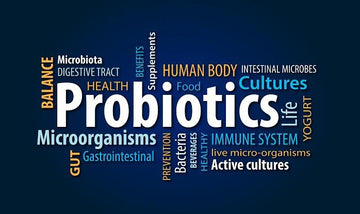We all want clear skin. From beauty products to magazines, the goal is to achieve a healthy, radiant complexion.
Yet for all the interest in having glowing skin, most discussions about skin health miss talking about the root cause because skin regimens tend to focus on treating skin from the outside, targeting a blemish or irritation as just an external event.
However, skin issues may be about more than what is visible on the surface. Current studies suggest that our internal health, specifically of our digestive system, where most of our immunity is stored, says the most about skin health (Caspero, 2017). When it comes down to it, the root of breakouts and occurrences of dermatitis is more than skin deep.
Skin Reveals Internal Health

 What is revealing about this finding is that linking digestive health to skin health means that dietary changes (including supplement use), which improve the balance of the microbiome in the gastrointestinal (GI) tract, can benefit the appearance of skin. And, essentially, that means that “science now points us inward to treat the outward. Heal the gut, heal the skin” (Caspero, 2017).
What is revealing about this finding is that linking digestive health to skin health means that dietary changes (including supplement use), which improve the balance of the microbiome in the gastrointestinal (GI) tract, can benefit the appearance of skin. And, essentially, that means that “science now points us inward to treat the outward. Heal the gut, heal the skin” (Caspero, 2017).
The “Gut-Skin Axis” and the Truth About Acne
 Acne is often a concern of teenagers, yet acne is increasingly occurring for adults who find themselves surprised to experience breakouts they had associated with teen years. It demands questioning the cause rather than just treating the symptoms.
Acne is often a concern of teenagers, yet acne is increasingly occurring for adults who find themselves surprised to experience breakouts they had associated with teen years. It demands questioning the cause rather than just treating the symptoms. When we look to the cause, what we find is the importance of the relationship between skin irritations and gastrointestinal health. Both play defensive roles against pathogens and in communicating neuroendocrine system messages (Minich 2017).
This means that the body’s external defense from skin and internal defense from the GI tract work mutually to maintain microbiome balance and together impact the strength of an individual’s immunity.
This dynamic is called the “gut-skin axis,” with other references to the “gut-brain-skin axis” (and “gut-brain” axis) due to the body’s communication systems and the influence of mental and emotional states on gut disorders (Minich 2017). Important to notice is that the gut is the common denominator; it’s the core factor in your health.
So, what’s the issue with acne? Well, it’s not just about teenagers. It makes sense, if skin clarity is related to gut wellness, that teens and adults alike are susceptible to breakouts.
Because while acne is not “a disease of the gastrointestinal tract,” there “appears to be more than enough supportive evidence to suggest that gut microbes, and the integrity of the gastrointestinal tract itself, are contributing factors in the acne process” (Bowe and Logan 2011).
 The root of the issue is in the digestive tract: reducing symptoms of acne and inflammation requires healing bacterial imbalance in the gut.
The root of the issue is in the digestive tract: reducing symptoms of acne and inflammation requires healing bacterial imbalance in the gut.The way to regain balance for gut health comes from both dietary measures (Consumer Reports 2017) and intentionally added good bacteria (probiotics).
In that regard, when people ask, are probiotics good for your skin? And can probiotics clear acne?, evidence speaks to the answer being yes, providing that probiotic use accompanies other holistic measures including healthy diet and exercise.
Probiotics can’t override the effects of poor diet (which the gut reflects), yet probiotics can significantly improve the bacterial balance in favor of good microorganisms, and gut health influences skin health, which can be good for your skin. Interestingly, contemporary studies have affirmed connections and treatments previously hypothesized in dermatological research, long before the term probiotics became mainstream (Bowe and Logan 2011).
Increasing evidence points to the importance of gut health and the treatment potential of acne through probiotics supplementation.
As Bowe and Logan note, “the theoretical value of oral probiotics as adjuvant care in acne vulgaris seems sound. Recent studies have shown that orally consumed pre and probiotics can reduce system markers of inflammation and oxidative stress”(2011). That is,probiotics can help clear acne and benefit acne occurrence, including helping reduce cystnic acne.
Research also indicates that probiotics are good for your skin by improving leaky gut symptoms which contribute to skin disorders and skin problems.
Clinical Results
In a recent clinical study, "54 female university students who experience dry skin [took] 'K -1 lactic acid bacteria,' 100 mg (100 billion bacteria), or a simulated food (placebo) for 6 weeks during winter. During this time, amount of transdermal moisture transpiration, skin texture, and acne, which are all an indicator for skin barrier function were investigated." The group receiving the probiotic dosage experienced skin improvement, as indicated by the following results (Kameda Seika):
I. Improved Skin Barrier Function

II. Improved Skin Texture

III. Decreased Occurrence of Acne

Even Dermatitis Irritations Like Eczema or Rosacea Reflect Gut Health
Similar to acne, dermatitis conditions like eczema and rosacea are related to gut disorders (Minich 2017).
With eczema little patch of rough, red, itchy skin can become an entire area of redness and irritation in less than a day. Common among many people, and occurring from wrists to faces to arms and legs and the torso - basically, anywhere and everywhere - eczema is an uncomfortable and unsightly skin affliction. Many adults with eczema symptoms also experienced it as a child.
 While eczema, also called atopic dermatitis, was previously routinely treated as a skin sensitivity issue, recent studies reveal that eczema is related to diet and specifically to gut health (Nall, 2018). Thus, the flare up of eczema rashes and outbreaks is reflective of the health or imbalance of an individual’s microbiome. This discovery is important because of how eczema is treated and because of what it tells us about internal wellness, which is relevant to the skin conditions apparent in toddler eczema, kids' eczema, and adult eczema. And this gut-skin connection is now recognized: “emerging research is finding that the benefits of probiotics may extend beyond the digestive tract to the skin. In fact, skin prone to acne or rosacea has shown improvement with daily probiotic use, giving dermatologists reason to consider supplementing traditional acne therapy with a dose of this beneficial bacteria” (AAD, 2014).
While eczema, also called atopic dermatitis, was previously routinely treated as a skin sensitivity issue, recent studies reveal that eczema is related to diet and specifically to gut health (Nall, 2018). Thus, the flare up of eczema rashes and outbreaks is reflective of the health or imbalance of an individual’s microbiome. This discovery is important because of how eczema is treated and because of what it tells us about internal wellness, which is relevant to the skin conditions apparent in toddler eczema, kids' eczema, and adult eczema. And this gut-skin connection is now recognized: “emerging research is finding that the benefits of probiotics may extend beyond the digestive tract to the skin. In fact, skin prone to acne or rosacea has shown improvement with daily probiotic use, giving dermatologists reason to consider supplementing traditional acne therapy with a dose of this beneficial bacteria” (AAD, 2014).
What it means, then, is that probiotics might play a significant role when included in treatment approaches fo a variety of skin disorders, including incorporating probiotics use for psoriasis and rashes and preventative probiotics for skin infections.
By contributing to bacterial balance in the digestive track, regular use of probiotics supplements benefit general skin health, which is a vital component of an individual's immunity, especially for anyone with hormonal fluctuations, such as during puberty, menstruation, pregnancy, and menopause (Griffin+Row, 2018).
A Different Treatment Approach
The trouble with typical treatment approaches for eczema is that steroid creams are often prescribed (Kim, 2017), and while corticosteroids may be necessary in certain situations, routine use or even frequent use can further weaken skin and miss the root cause. Ongoing use of corticosteroids can cause thinning of skin (atrophy), especially already delicate skin, such as near eyes and on hands; skin thickening (lichenification); stretch marks (striae); and darkening of skin (NEA, 2018). While these side effects are rare with correct use, the risk remains that topical steroids can negatively disrupt skin health, and that risk increases when they are used to managed frequent flare-ups.

A more holistic approach to treating skin issues like eczema and rosacea lie in identifying the triggers that cause flare-ups to occur and in employing preventative management of irritants. Since eczema reflects internal inflammation, topical treatment alone “cannot fully heal and reverse eczema” because “conventional medicine is only trying to superficially suppress the outside symptoms” (Myers, 2016).
Essentially eczema is the “external symptom of an internal problem” (a “malfunctioning immune system”) (Myers, 2016). The immune system, kicked into overdrive by perceived threats, ends ups attacking the skin.
Many of these perceived threats are from unrecognized dietary allergies, yet autoimmune disruptions like eczema are often strong indicators of a “poorly functioning intestinal tract” and weakened gut health (Myers, 2016). Eczema and gut health are invariably connected.
The same is true for rosacea: “Recent studies in the United Kingdom, South Korea and Denmark have found significant associations between rosacea and inflammatory bowel disease (IBD), lending further evidence to a possible connection between the two inflammatory disorders” (National Rosacea Society, 2016). Again, the link between internal, imbalanced gut health and external skin issues is connected.
That’s why dietary probiotics supplements, along with dietary changes, can be helpful: because eczema is a “gut disorder that shows up in the skin” (Body Ecology). By contributing to restoring the balance of good and bad bacteria in the gut, probiotics can help heal the underlying triggers: “In a 2011 study, researchers concluded that probiotics can influence the ecosystem of the skin” (Body Ecology). And if we can improve the microbiome, we might heal the skin ailment.
Finding the Solution
So what now? It’s evident that many skin issues, from break-outs to eczema and rosacea are more than superficial irritations and instead indicate deeper rooted gut health and autoimmunity weakness. That might initially feel discouraging to hear, yet it’s actually positive: by communicating internal inflammation through skin irritation, our bodies visibly convey messages about our gut health. These indicators give us the opportunity to look deeper at our microbiome and at the lifestyle changes we might have been wanting. Since it’s more than skin deep, these skin struggles might be the very motivation that inspires us to change our habits and heal our guts.

How probiotics help with digestive health
Since the digestive tract contains good and bad bacteria, probiotics, which are the good bacteria - that is, beneficial living microorganisms, help tilt the scale in favor of the good bacteria. Having sufficient levels of helpful bacterias creates the digestive balance that contributes to healthy skin functioning.
While other factors, such as healthy diets, reduced environmental allergens, and gentle cleansers, can also help skin, probiotics are fundamental: “The GI tract and skin are both organs of detoxification. We need a healthy microbiome in the gut to break down food, absorb nutrients, and eliminate toxins. When our gut flora is not healthy, and there are more bad bacteria than good bacteria, a lot of problems can arise — including chronic inflammation, which is a cause of acne and other skin problems. Some bad bacteria, fungus, and yeast can even cause inflammation in and of themselves. So, if you are looking to clear up your skin, you have to start with your gut” (Hou, 2014).

Improving microbiome imbalance requires taking a quality probiotics supplement with a high enough CFU (colony forming units) count as well as supporting research on the selected strain.
sho Balance vegan probiotics, with 100 Billion CFU of Lactobacillus Casei K-1, specifically selected for its clinically tested efficacy, additionally contains a prebiotic FOS, spirulina, flaxseed and olive oil for antioxidant benefit.
The link is evident: a balanced gut environment, supported by regular probiotics use, is the starting point for clearer, healthier skin.
References:
- American Association of Dermatology (AAD). (2014). Could probiotics be the next big thing in acne and rosacea treatments? In AAD online. Retrieved from https://www.aad.org/media/news-releases/could-probiotics-be-the-next-big-thing-in-acne-and-rosacea-treatments
- Bowe, W.P. and A. Logan. (2011). Acne vulgaris, probiotics and the gut-brain-skin axis - back to the future? In NCBI. Retrieved from https://www.ncbi.nlm.nih.gov/pmc/articles/PMC3038963/
- Caspero, A. (2017). Gut health: Why good internal health equals good skin. In Skin Deep. Accessed from http://eds.b.ebscohost.com/eds/pdfviewer/pdfviewer?vid=4&sid=49ba239d-102b-4046-9540-3841968da818%40sessionmgr103
- Consumer Reports (2017). 6 foods that are good for your gut health. In Consumer Reports. Retrieved from https://www.consumerreports.org/healthy-eating/foods-that-are-good-for-gut-health/
- Dallas, M.E. with Jones, N., MD. Eating right for rosacea: Answers from Dr. Chutkan.” In Everyday Health. Retrieved from https://www.everydayhealth.com/rosacea/eating-right-for-rosacea-answers-from-dr-chutkan.aspx
- Eczema and inflammation: The inner ecosystem connection.” In Body Ecology. Retrieved from https://bodyecology.com/articles/eczema-and-inflammation-the-inner-ecosystem-connection
- Griffin+Row. (2018). Hormones and your skin - puberty, pregnancy, menstruation, and menopause. Retrieved from https://www.griffinandrow.com/education/skin-biology/skin-physiology/hormones-skin-puberty-pregnancy-menstruation-menopause/
- Hou, K. (2014). How probiotics will improve your skin. In The Cut. Retrieved from https://www.thecut.com/2014/06/can-probiotics-really-improve-your-skin.html
- Kim, MD. B. S. 2017. Atopic dermatitis. In Medscape. Retrieved from https://emedicine.medscape.com/article/1049085-overview
- Minich, D. (2017). The gut-skin axis: The importance of gut health for radiant skin. HuffPost. https://www.huffingtonpost.com/entry/the-gut-skin-axis-the-importance-of-gut-health-for_us_5983db63e4b00833d1de2703
- Myers, A. 2016. How to treat eczema from the inside out. In Amy Myers MD. Retrieved from https://www.amymyersmd.com/2016/04/treat-eczema-inside/
- Nall, R. (2018). Eczema elimination diet and foods to eat. In Medical News Today. Retrieved from https://www.medicalnewstoday.com/articles/320855.php
- National Rosacea Society. (2016). Further studies link gut health and rosacea. In National Rosacea Society. Retrieved from https://www.rosacea.org/weblog/further-studies-link-ibd-and-rosacea
- Schettle, PA-C, L. and Lio,M.D., P.A. Probiotics: The search for bacterial balance. In National Eczema Association. Retrieved from https://nationaleczema.org/search-bacterial-balance/








MEET HOT LOCAL GIRLS TONIGHT WE GUARANTEE FREE SEX DATING IN YOUR CITY CLICK THE LINK:
FREE SEX
IifabyEvDVUqrA
kuNfAYXzaJLCe
VWfNhSlUE
sXoYyZWPtDO